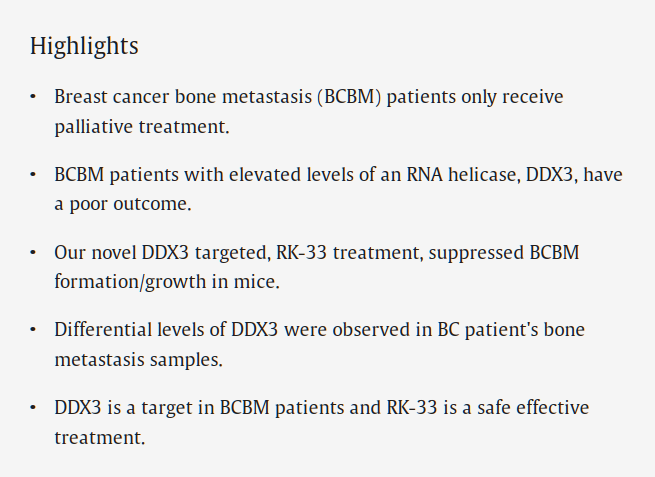Targeting RNA helicase DDX3X with a small molecule inhibitor for breast cancer bone metastasis treatment
Vol. 604, Published Nov. 1, 2024

CITATION AND ABSTRACT
Paul T. Winnard, Farhad Vesuna, Guus M. Bol, Kathleen L. Gabrielson, Georgia Chenevix-Trench, Natalie D. ter Hoeve, Paul J. van Diest, Venu Raman,
Targeting RNA helicase DDX3X with a small molecule inhibitor for breast cancer bone metastasis treatment,
Cancer Letters,
Volume 604,
2024,
217260,
ISSN 0304-3835,
https://doi.org/10.1016/j.canlet.2024.217260.
(https://www.sciencedirect.com/science/article/pii/S0304383524006554)
Abstract: Patients who present with breast cancer bone metastasis only have limited palliative treatment strategies and efficacious drug treatments are needed. In breast cancer patient data, high levels of the RNA helicase DDX3 are associated with poor overall survival and bone metastasis. Consequently, our objective was to target DDX3 in a mouse breast cancer bone metastasis model using a small molecule inhibitor of DDX3, RK-33. Histologically confirmed live imaging indicated no bone metastases in the RK-33 treated cohort, as opposed to placebo-treated mice. We generated a cell line from a bone metastatic lesion in mouse and found that it along with a patient-derived bone metastasis cell line gained resistance to conventional chemotherapeutics but not to RK-33. Finally, differential levels of DDX3 were observed in breast cancer patient metastatic bone samples. Overall, this study indicates that DDX3 is a relevant clinical target in breast cancer bone metastasis and that RK-33 can be a safe and effective treatment for these patients.
Keywords: DDX3; Breast cancer; Bone metastases; RK-33; Intra-caudal artery injections
TRANSLATION:
In Summary:
Researchers have identified that the DDX3X protein plays a significant role in the spread of breast cancer to bones. They developed a compound, RK-33, which inhibits this protein. In laboratory and animal studies, RK-33 effectively reduced tumor growth and prevented further spread in bone tissues without causing severe side effects. These findings suggest that targeting DDX3X with RK-33 holds promise as a potential treatment for breast cancer patients with bone metastases.
Background: Understanding the Players
Breast Cancer and Bone Metastasis:
- Breast cancer is a common cancer among women.
- Sometimes, cancer cells spread from the original tumor to other parts of the body, a process known as metastasis.
- The bones are a frequent site for these metastatic cells to settle, leading to bone metastases.
- Bone metastases can cause significant pain and complications, and treating them effectively remains a challenge.
DDX3X Protein:
- Within our cells, there’s a protein called DDX3X, which belongs to a family of proteins known as RNA helicases.
- These proteins are involved in various cellular processes, including the production of other proteins.
- Research has shown that higher levels of DDX3X are present in certain cancers, including breast cancer, and are associated with more aggressive disease and poorer patient outcomes.
The Research Focus
Given the link between elevated DDX3X levels and aggressive breast cancer, scientists aimed to explore whether inhibiting DDX3X could be a potential strategy to treat breast cancer, especially when it has spread to the bones.
The Experiment: Testing RK-33
Introducing RK-33:
- Researchers developed a compound named RK-33, designed specifically to inhibit the activity of the DDX3X protein.ResearchGate+3Johns Hopkins University+3PubMed+3
Laboratory Studies:
- In controlled lab settings, scientists treated breast cancer cells with RK-33.
- They observed that RK-33 effectively reduced the growth and spread of these cancer cells.
Animal Studies:
- To understand how RK-33 works in a living system, the compound was tested in mouse models of breast cancer that had bone metastases.
- Mice treated with RK-33 showed a significant reduction in bone metastases compared to those that did not receive the treatment.
- Importantly, the treatment was well-tolerated, meaning the mice did not experience severe side effects.
Key Findings
- DDX3X as a Therapeutic Target:
- The study reinforced that DDX3X plays a crucial role in the progression of breast cancer, especially in cases where the cancer has spread to the bones.
- Effectiveness of RK-33:
- By inhibiting DDX3X, RK-33 was able to reduce tumor growth and prevent further spread of the cancer in bone tissues.
- Potential for Safe Treatment:
- The absence of significant adverse effects in the animal models suggests that RK-33 could be a safe therapeutic option for patients.ACS Publications
Implications of the Study
This research offers promising insights into a potential new treatment avenue for patients suffering from breast cancer that has metastasized to the bones. By targeting the DDX3X protein with RK-33, there’s hope for a therapy that not only halts the progression of the disease but does so with minimal side effects.ResearchGate
Looking Ahead
While the results from this study are encouraging, it’s essential to note that these findings are preliminary. The next steps would involve conducting clinical trials with human participants to determine the safety and effectiveness of RK-33 in treating breast cancer bone metastases in patients.

Leave a Reply